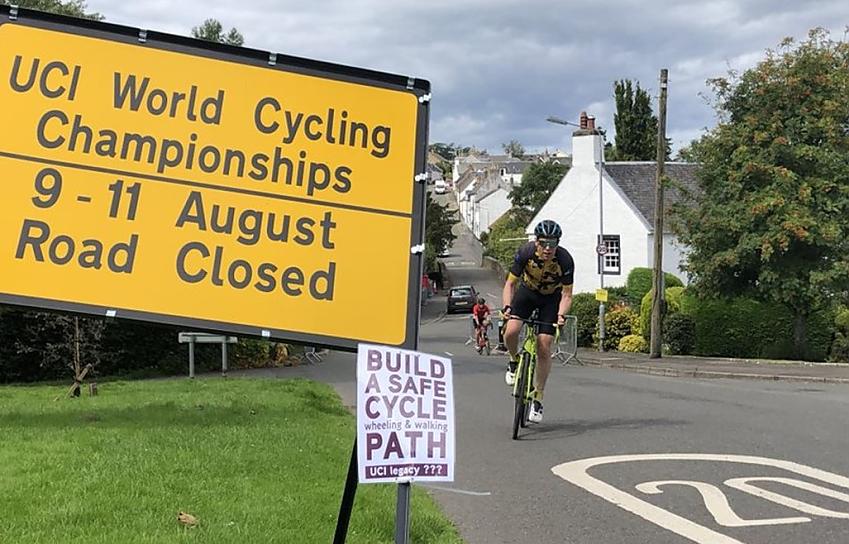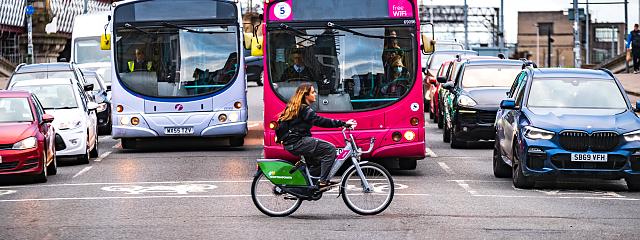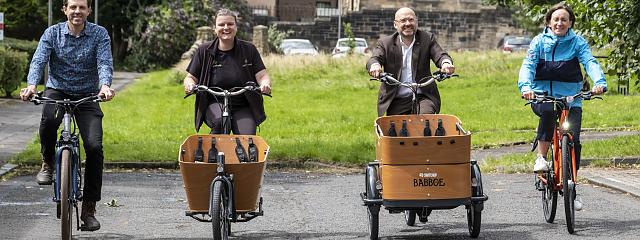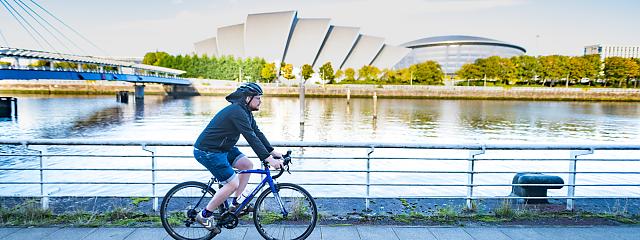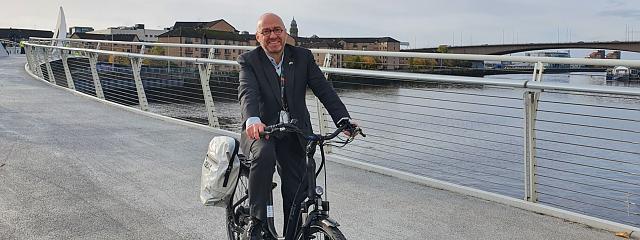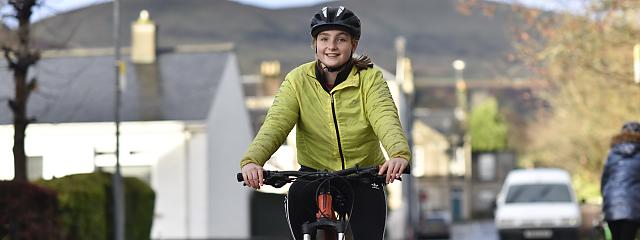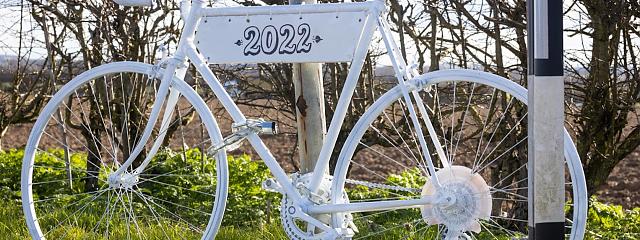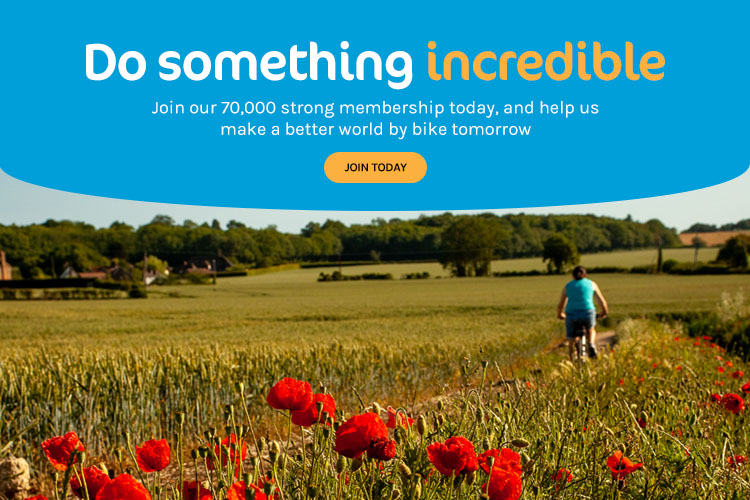
Creating a lasting legacy of the World Championships
Creating a lasting legacy of the World Championships
Glasgow is buzzing! I live in the city and it’s an exciting place to be with the UCI World Championships in town.
I have been lucky enough to go to the Sir Chris Hoy Velodrome to watch the track racing and also be part of the huge crowds experiencing the thrill of the men’s road race on the steep Montrose Street and Mathieu van der Poel flashing past on his way to victory.
On the way to a meeting on Monday I stood by the barriers and cheered under 12s from across Scotland competing on Glasgow’s closed roads in a Race the Worlds race.
With many officials, delegates and politicians in Glasgow it has also been rewarding to represent Cycling UK at a number of side events – talking to decision-makers about our work and how the World Championships can be a launchpad to more people cycling in Scotland.
There are many positives to take from these World Championships already – the success of a first ever combined Cycling World Championships, and the velodrome crowd shouting just as loudly for the para cyclists as they do for the elite racers in the integrated programme.
Also, the somewhat controversial twisty city centre course made the road race accessible for so many Glaswegians and visitors from all over the world, creating lasting memories and perhaps inspiring people to get on a bike.
A legacy, however, of a huge event like this needs to be bigger, long lasting and make a difference to the lives of many more in Scotland.
Power of the bike
Everywhere in Glasgow there are flags and banners emblazoned with Power of the Bike – the strapline and hashtag for these World Championships.
The organiser’s have been bold in describing the Power of the Bike and the legacy of the World Championships as ‘Everyone should be able to experience the freedom a bike can bring to our lives’ and ‘Encourage cycling as a mode of transport for everyday journeys’.
First Minister Humza Yousaf reflected this on the eve of the event: “This is also a great opportunity to promote the broader benefits of active travel for us all which helps to reduce carbon emissions.”
At Cycling UK we can’t argue with these sentiments but is it going to happen?
The reality of sporting events is that they don’t tend to lead to increased participation in physical activity.
In the years following the 2012 Olympic and Paralympic Games in London, the National Audit Office showed that participation in sport actually declined, despite the UK Government committing to legacy of increased grassroots sports participation.
Sports leaders agree that the biggest legacy failures were in not “delivering a sporting and physically active nation and inspiring a generation of young people to create a sporting habit for life”.
Even in cycling the experience of the 2018 World Championships in Austria is that, on its own, the event didn’t lead to more participation in cycling.
Furthermore, the study recommended that “an event of this size should result in substantial improvements in local cycling infrastructure. Otherwise, an opportunity to make the behavioural change happen can be missed easily.”
Glasgow and the Scottish Government must learn the lessons from the past and create a real legacy by investing in projects which enable people to cycle as part of their normal lives.
The Scottish Government, local authorities and partner organisations must work hard, with total focus for the next 10 years and beyond to make Scotland a truly cycle-friendly nation.
Jim Densham, Cycling UK’s campaign and policy manager for Scotland
Creating a legacy needs investment
Ensuring there is a lasting legacy takes effort – local and national government can’t sit back and wait for hundreds of kids to join cycle clubs or thousands more people to begin commuting to work next week.
Sadly, legacy doesn’t work like that.
A legacy aim for the World Championships in Glasgow must be a sustained increase in people cycling as part of their normal lives, but this can only happen if our national and local governments work together to prioritise investment in cycling as a mode of transport and create the conditions which make cycling a safe, easy and pleasurable option for daily journeys.
The Scottish Government has committed to spending 10% of the transport budget on active travel next year, or at least £320m. Investment at this level will put Scotland in the right place to become a cycle-friendly nation but will only create a legacy if that level of spend is maintained in years to come.
So, despite the current squeeze on public finances, Finance Secretary Shona Robison MSP must fulfil this firm promise and ensure that finances are in place to create an everyday cycling legacy.
World-class cycling infrastructure needed
Scotland, like the rest of the UK, needs to create a larger, more coherent network of safe cycle routes which we know from experience will enable people to shift from using a car to riding a bike.
I attended a meeting last week where Patrick Harvie MSP, Scotland’s minister for active travel, expressed his opinion that the “next generation will not thank us” if the Scottish Government doesn’t get the infrastructure right and future-proof city centres.
It’s been good to see communities in Scotland use the World Championships to shine a light on the need for safe cycling infrastructure.
Campaigners in rural Gargunnock are using the opportunity of closed roads through the village for the time trials to renew their calls for a safe cycle path to Stirling. The plans and designs are well progressed but before diggers can get in the ground there are still issues to be ironed out, including finding funds for ongoing maintenance of the cycle path in the years to come.
This issue of ongoing costs is not a situation unique to Stirling Council and is why a legacy for the World Championships must include not only capital investment in cycling infrastructure, but also funding for maintenance and for projects, like the ones run by Cycling UK, which support people to ride a bike – giving them the skills and confidence to ride the roads and cycle paths for everyday journeys.
Bikeland
Scotland was dubbed ‘Bikeland’ on the eve of the championships but Bikeland for 10 days is not enough – it would be a poor legacy.
The Scottish Government, local authorities and partner organisations must work hard, with total focus for the next 10 years and beyond to make Scotland a truly cycle-friendly nation.
A real Bikeland where riding a bike is seen as a normal way of travel and where everyone has the opportunity to cycle for sport and play, or, as the majority can, for short everyday journeys.







